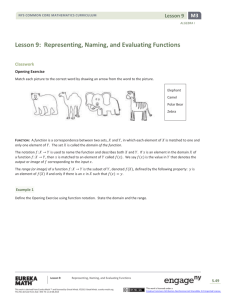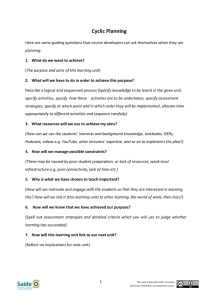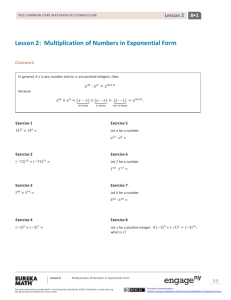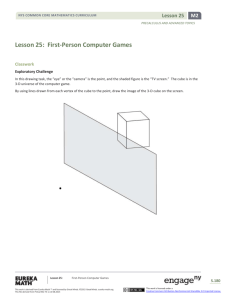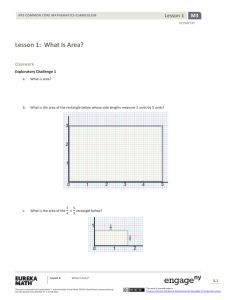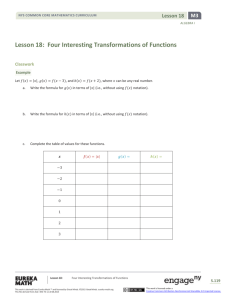Precalculus Module 2, Topic A, Lesson 3: Student
advertisement
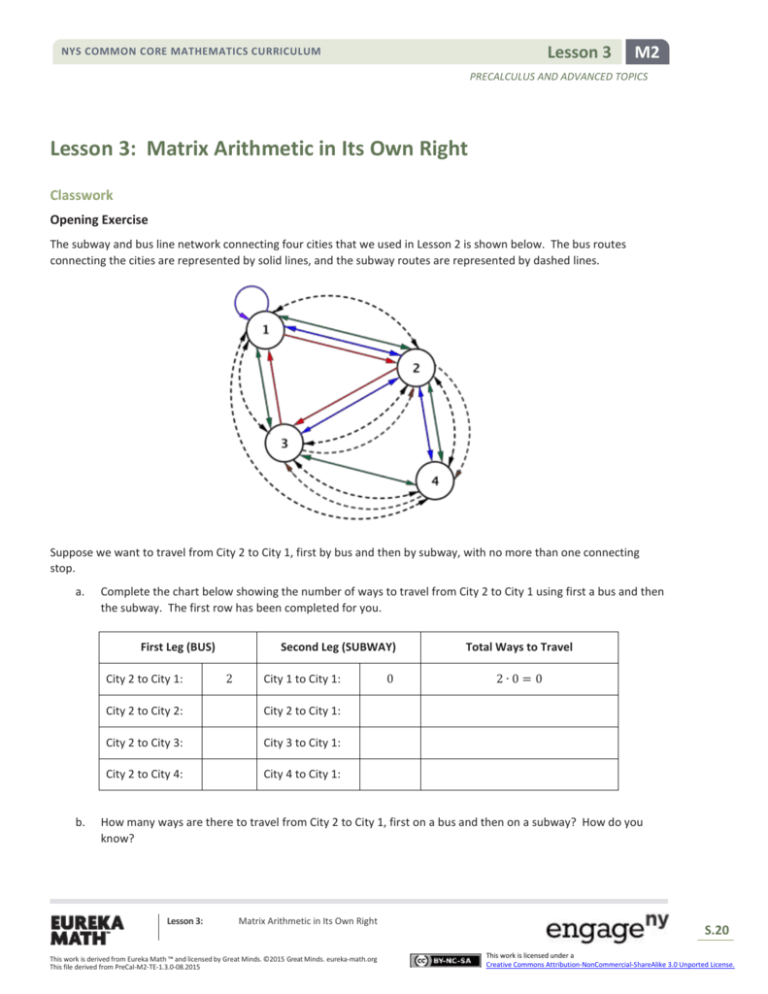
Lesson 3 NYS COMMON CORE MATHEMATICS CURRICULUM M2 PRECALCULUS AND ADVANCED TOPICS Lesson 3: Matrix Arithmetic in Its Own Right Classwork Opening Exercise The subway and bus line network connecting four cities that we used in Lesson 2 is shown below. The bus routes connecting the cities are represented by solid lines, and the subway routes are represented by dashed lines. Suppose we want to travel from City 2 to City 1, first by bus and then by subway, with no more than one connecting stop. a. Complete the chart below showing the number of ways to travel from City 2 to City 1 using first a bus and then the subway. The first row has been completed for you. First Leg (BUS) City 2 to City 1: b. Second Leg (SUBWAY) 2 City 1 to City 1: City 2 to City 2: City 2 to City 1: City 2 to City 3: City 3 to City 1: City 2 to City 4: City 4 to City 1: 0 Total Ways to Travel 2∙0=0 How many ways are there to travel from City 2 to City 1, first on a bus and then on a subway? How do you know? Lesson 3: Matrix Arithmetic in Its Own Right This work is derived from Eureka Math ™ and licensed by Great Minds. ©2015 Great Minds. eureka-math.org This file derived from PreCal-M2-TE-1.3.0-08.2015 S.20 This work is licensed under a Creative Commons Attribution-NonCommercial-ShareAlike 3.0 Unported License. Lesson 3 NYS COMMON CORE MATHEMATICS CURRICULUM M2 PRECALCULUS AND ADVANCED TOPICS Exploratory Challenge/Exercises 1–12: The Meaning of Matrix Multiplication Suppose we want to travel between all cities, traveling first by bus and then by subway, with no more than one connecting stop. 1. Use a chart like the one in the Opening Exercise to help you determine the total number of ways to travel from City 1 to City 4 using first a bus and then the subway. 2. Suppose we create a new matrix 𝑃 to show the number of ways to travel between the cities, first by bus and then by subway, with no more than one connecting stop. Record your answers to Opening Exercise, part (b) and Exercise 1 in this matrix in the appropriate row and column location. We do not yet have enough information to complete the entire matrix. Explain how you decided where to record these numbers in the matrix shown below. ___ ___ 𝑃 = [___ ___ 3. ___ ___ ___ ___ ___ ___ ___ ___ ___ ___ ___] ___ What is the total number of ways to travel from City 3 to City 2 first by bus and then by subway with no more than one connecting stop? Explain how you got your answer and where you would record it in matrix 𝑃 above. Lesson 3: Matrix Arithmetic in Its Own Right This work is derived from Eureka Math ™ and licensed by Great Minds. ©2015 Great Minds. eureka-math.org This file derived from PreCal-M2-TE-1.3.0-08.2015 S.21 This work is licensed under a Creative Commons Attribution-NonCommercial-ShareAlike 3.0 Unported License. Lesson 3 NYS COMMON CORE MATHEMATICS CURRICULUM M2 PRECALCULUS AND ADVANCED TOPICS Recall matrix 𝐵, which shows the number of bus lines connecting the cities in this transportation network, and matrix 𝑆, which represents the number of subway lines connecting the cities in this transportation network. 1 2 𝐵=[ 2 0 3 0 1 2 1 2 0 1 0 0 2 1 ] and 𝑆 = [ 1 1 0 1 1 0 2 1 1 1 0 2 1 2 ] 1 0 4. What does the product 𝑏1,2 𝑠2,4 represent in this situation? What is the value of this product? 5. What does 𝑏1,4 𝑠4,4 represent in this situation? What is the value of this product? Does this make sense? 6. Calculate the value of the expression 𝑏1,1 𝑠1,4 + 𝑏1,2 𝑠2,4 + 𝑏1,3 𝑠3,4 + 𝑏1,4 𝑠4,4 . What is the meaning of this expression in this situation? 7. Circle the first row of 𝐵 and the second column of 𝑆. How are these entries related to the expression above and your work in Exercise 1? Lesson 3: Matrix Arithmetic in Its Own Right This work is derived from Eureka Math ™ and licensed by Great Minds. ©2015 Great Minds. eureka-math.org This file derived from PreCal-M2-TE-1.3.0-08.2015 S.22 This work is licensed under a Creative Commons Attribution-NonCommercial-ShareAlike 3.0 Unported License. NYS COMMON CORE MATHEMATICS CURRICULUM Lesson 3 M2 PRECALCULUS AND ADVANCED TOPICS 8. Write an expression that represents the total number of ways you can travel between City 2 and City 1, first by bus and then by subway, with no more than one connecting stop. What is the value of this expression? What is the meaning of the result? 9. Write an expression that represents the total number of ways you can travel between City 4 and City 1, first by bus and then by subway, with no more than one connecting stop. What is the value of this expression? What is the meaning of the result? 10. Complete matrix 𝑃 that represents the routes connecting the four cities if you travel first by bus and then by subway. 11. Construct a matrix 𝑀 that represents the routes connecting the four cities if you travel first by subway and then by bus. 12. Should these two matrices be the same? Explain your reasoning. Lesson 3: Matrix Arithmetic in Its Own Right This work is derived from Eureka Math ™ and licensed by Great Minds. ©2015 Great Minds. eureka-math.org This file derived from PreCal-M2-TE-1.3.0-08.2015 S.23 This work is licensed under a Creative Commons Attribution-NonCommercial-ShareAlike 3.0 Unported License. Lesson 3 NYS COMMON CORE MATHEMATICS CURRICULUM M2 PRECALCULUS AND ADVANCED TOPICS Exercises 13–16 2 3 −1 13. Let 𝐴 = [0 1 2 ] 1 0 0 a. Construct a matrix 𝑍 such that 𝐴 + 𝑍 = 𝐴. Explain how you got your answer. b. Explain why 𝑘 ∙ 𝑍 = 𝑍 for any real number 𝑘. c. The real number 0 has the properties that 𝑎 + 0 = 0 and 𝑎 ∙ 0 = 0 for all real numbers 𝑎. Why would mathematicians call 𝑍 a zero matrix? 14. Suppose each city had a trolley car that ran a route between tourist destinations. The blue loops represent the trolley car routes. Remember that straight lines indicate bus routes, and dotted lines indicate subway routes. Lesson 3: Matrix Arithmetic in Its Own Right This work is derived from Eureka Math ™ and licensed by Great Minds. ©2015 Great Minds. eureka-math.org This file derived from PreCal-M2-TE-1.3.0-08.2015 S.24 This work is licensed under a Creative Commons Attribution-NonCommercial-ShareAlike 3.0 Unported License. NYS COMMON CORE MATHEMATICS CURRICULUM Lesson 3 M2 PRECALCULUS AND ADVANCED TOPICS a. Explain why the matrix 𝐼 shown below would represent the number of routes connecting cities by trolley car in this transportation network. 1 0 0 0 0 1 0 0 𝐼=[ ] 0 0 1 0 0 0 0 1 b. Recall that 𝐵 is the bus route matrix. Show that 𝐼 ∙ 𝐵 = 𝐵. Explain why this makes sense in terms of the transportation network. c. The real number 1 has the property that 1 ∙ 𝑎 = 𝑎 for all real numbers 𝑎, and we call 1 the multiplicative identity. Why would mathematicians call 𝐼 an identity matrix? d. What would be the form of a 2 × 2 identity matrix? What about a 3 × 3 identity matrix? 15. In this lesson you learned that the commutative property does not hold for matrix multiplication. This exercise asks you to consider other properties of real numbers applied to matrix arithmetic. a. Is matrix addition associative? That is, does (𝐴 + 𝐵) + 𝐶 = 𝐴 + (𝐵 + 𝐶) for matrices 𝐴, 𝐵, and 𝐶 that have the same dimensions? Explain your reasoning. Lesson 3: Matrix Arithmetic in Its Own Right This work is derived from Eureka Math ™ and licensed by Great Minds. ©2015 Great Minds. eureka-math.org This file derived from PreCal-M2-TE-1.3.0-08.2015 S.25 This work is licensed under a Creative Commons Attribution-NonCommercial-ShareAlike 3.0 Unported License. NYS COMMON CORE MATHEMATICS CURRICULUM Lesson 3 M2 PRECALCULUS AND ADVANCED TOPICS b. Is matrix multiplication associative? That is, does (𝐴 ∙ 𝐵) ∙ 𝐶 = 𝐴 ∙ (𝐵 ∙ 𝐶) for matrices 𝐴, 𝐵, and 𝐶 for which the multiplication is defined? Explain your reasoning. c. Is matrix addition commutative? That is, does 𝐴 + 𝐵 = 𝐵 + 𝐴 for matrices 𝐴 and 𝐵 with the same dimensions? 16. Complete the graphic organizer to summarize your understanding of the product of two matrices. Operation Symbols Matrix Multiplication 𝐴∙𝐵 Lesson 3: Describe How to Calculate Matrix Arithmetic in Its Own Right This work is derived from Eureka Math ™ and licensed by Great Minds. ©2015 Great Minds. eureka-math.org This file derived from PreCal-M2-TE-1.3.0-08.2015 Example Using 𝟑 × 𝟑 Matrices S.26 This work is licensed under a Creative Commons Attribution-NonCommercial-ShareAlike 3.0 Unported License. NYS COMMON CORE MATHEMATICS CURRICULUM Lesson 3 M2 PRECALCULUS AND ADVANCED TOPICS Lesson Summary MATRIX PRODUCT: Let 𝐴 be an 𝑚 × 𝑛 matrix whose entry in row 𝑖 and column 𝑗 is 𝑎𝑖,𝑗 , and let 𝐵 be an 𝑛 × 𝑝 matrix whose entry in row 𝑖 and column 𝑗 is 𝑏𝑖,𝑗 . Then the matrix product 𝐴𝐵 is the 𝑚 × 𝑝 matrix whose entry in row 𝑖 and column 𝑗 is 𝑎𝑖,1 𝑏1,𝑗 + 𝑎𝑖,2 𝑏2,𝑗 + ⋯ + 𝑎𝑖,𝑛 𝑏𝑛,𝑗 . IDENTITY MATRIX: The 𝑛 × 𝑛 identity matrix is the matrix whose entry in row 𝑖 and column 𝑖 for 1 ≤ 𝑖 ≤ 𝑛 is 1, and whose entries in row 𝑖 and column 𝑗 for 1 ≤ 𝑖, 𝑗 ≤ 𝑛 and 𝑖 ≠ 𝑗 are all zero. The identity matrix is 1 0 0 1 0 denoted by 𝐼. The 2 × 2 identity matrix is [ ], and the 3 × 3 identity matrix is [0 1 0]. If the size of the 0 1 0 0 1 identity matrix is not explicitly stated, then the size is implied by context. ZERO MATRIX: The 𝑚 × 𝑛 zero matrix is the 𝑚 × 𝑛 matrix in which all entries are equal to zero. 0 0 0 0 0 For example, the 2 × 2 zero matrix is [ ], and the 3 × 3 zero matrix is [0 0 0]. If the size of the zero matrix 0 0 0 0 0 is not explicitly stated, then the size is implied by context. Problem Set 1. 2. 1 3 1 2 ] and 𝐵 = [ ] represent the bus routes of two companies between 2 cities. Find the product 𝐴 ⋅ 2 0 4 3 𝐵, and explain the meaning of the entry in row 1, column 2 of 𝐴 ⋅ 𝐵 in the context of this scenario. Let 𝐴 = [ 1 3 2 2 1 3 Let 𝐴 = [3 1 2] and 𝐵 = [2 2 1] represent the bus routes of two companies between three cities. 4 3 2 1 3 1 a. Let 𝐶 = 𝐴 ⋅ 𝐵. Find matrix 𝐶, and explain the meaning of entry 𝑐1,3 . b. Nina wants to travel from City 3 to City 1 and back home to City 3 by taking a direct bus from Company A on the way to City 1 and a bus from Company B on the way back home to City 3. How many different ways are there for her to make this trip? c. Oliver wants to travel from City 2 to City 3 by taking first a bus from Company A and then taking a bus from Company B. How many different ways can he do this? d. How many routes can Oliver choose from if he travels from City 2 to City 3 by first taking a bus from Company B and then taking a bus from Company A? Lesson 3: Matrix Arithmetic in Its Own Right This work is derived from Eureka Math ™ and licensed by Great Minds. ©2015 Great Minds. eureka-math.org This file derived from PreCal-M2-TE-1.3.0-08.2015 S.27 This work is licensed under a Creative Commons Attribution-NonCommercial-ShareAlike 3.0 Unported License. Lesson 3 NYS COMMON CORE MATHEMATICS CURRICULUM M2 PRECALCULUS AND ADVANCED TOPICS 3. Recall the bus and trolley matrices from the lesson: 1 2 𝐵=[ 2 0 4. 3 0 1 2 1 2 0 1 0 1 0 0 0 0 1 0 0 0 ] 0 1 a. Explain why it makes sense that 𝐵𝐼 = 𝐼𝐵 in the context of the problem. b. Multiply out 𝐵𝐼 and 𝐼𝐵 to show 𝐵𝐼 = 𝐼𝐵. c. Consider the multiplication that you did in part (b). What about the arrangement of the entries in the identity matrix causes 𝐵𝐼 = 𝐵? Consider the matrices 3 𝐴=[ a. b. c. 1 2 3 Multiply 𝐴𝐵 and 𝐵𝐴 or explain why you cannot. 2 5. 0 1 2 0 ] and 𝐼 = [ 1 0 0 0 1 1 2] and 𝐵 = [0 0 4 − 0 1] 0 Would you consider 𝐵 to be an identity matrix for 𝐴? Why or why not? 1 0 0 1 0 Would you consider 𝐼2 = [ ] or 𝐼3 = [0 1 0] an identity matrix for 𝐴? Why or why not? 0 1 0 0 1 We’ve shown that matrix multiplication is generally not commutative, meaning that as a general rule for two matrices 𝐴 and 𝐵, 𝐴 ⋅ 𝐵 ≠ 𝐵 ⋅ 𝐴. Explain why 𝐹 ⋅ 𝐺 = 𝐺 ⋅ 𝐹 in each of the following examples. 1 3 2 6 a. 𝐹 = [ ], 𝐺 = [ ] 2 0 4 0 1 3 2 0 0 0 b. 𝐹 = [3 1 2] , 𝐺 = [0 0 0] 4 3 2 0 0 0 1 3 2 1 0 0 c. 𝐹 = [3 1 2] , 𝐺 = [0 1 0] 4 3 2 0 0 1 1 3 2 3 0 0 d. 𝐹 = [3 1 2] , 𝐺 = [0 3 0] 4 3 2 0 0 3 Lesson 3: Matrix Arithmetic in Its Own Right This work is derived from Eureka Math ™ and licensed by Great Minds. ©2015 Great Minds. eureka-math.org This file derived from PreCal-M2-TE-1.3.0-08.2015 S.28 This work is licensed under a Creative Commons Attribution-NonCommercial-ShareAlike 3.0 Unported License. Lesson 3 NYS COMMON CORE MATHEMATICS CURRICULUM M2 PRECALCULUS AND ADVANCED TOPICS 6. Let 𝐼𝑛 be the 𝑛 × 𝑛 identity matrix. For the matrices given below, perform each of the following calculations or explain why the calculation is not possible: 1 𝐴 = [2 a. 𝐴𝐵 b. 𝐵𝐴 c. 𝐴𝐶 d. 𝐴𝐵𝐶 e. 𝐴𝐵𝐶𝐷 f. 𝐴𝐷 g. 𝐴2 h. 𝐶2 i. 𝐵𝐶 2 j. 𝐴𝐵𝐶 + 𝐴𝐷 k. 𝐴𝐵𝐼2 l. 𝐴𝐼2 𝐵 3 2 2 3 3 𝐶 = [1 3 1 0 1 𝐵=[ ] 3 1] 3 9 −3 2 𝐷=[ 3 −1 4 2 ] 1 √2 −2 2 1 1 2] 0 m. 𝐶𝐼3 𝐵 7. 8. n. 𝐼2 𝐵𝐶 o. 2𝐴 + 𝐵 p. 𝐵(𝐼3 + 𝐶) q. 𝐵 + 𝐵𝐶 r. 4𝐷𝐼4 Let 𝐹 be an 𝑚 × 𝑛 matrix. Then what do you know about the dimensions of matrix 𝐺 in the problems below if each expression has a value? a. 𝐹+𝐺 b. 𝐹𝐺 c. 𝐺𝐹 d. 𝐹𝐻𝐺 for some matrix 𝐻. Consider an 𝑚 × 𝑛 matrix 𝐴 such that 𝑚 ≠ 𝑛. Explain why you cannot evaluate 𝐴2 . Lesson 3: Matrix Arithmetic in Its Own Right This work is derived from Eureka Math ™ and licensed by Great Minds. ©2015 Great Minds. eureka-math.org This file derived from PreCal-M2-TE-1.3.0-08.2015 S.29 This work is licensed under a Creative Commons Attribution-NonCommercial-ShareAlike 3.0 Unported License. Lesson 3 NYS COMMON CORE MATHEMATICS CURRICULUM M2 PRECALCULUS AND ADVANCED TOPICS 9. 0 1 Let 𝐴 = [2 0 1 2 three cities. 2 0 1] , 𝐵 = [ 1 0 2 2 0 2 1 0 1] , 𝐶 = [0 0 1 2 0 2 1 1] represent the routes of three airlines 𝐴, 𝐵, and 𝐶 between 0 a. Zane wants to fly from City 1 to City 3 by taking Airline 𝐴 first and then Airline 𝐵 second. How many different ways are there for him to travel? b. Zane did not like Airline 𝐴 after the trip to City 3, so on the way home, Zane decides to fly Airline 𝐶 first and then Airline 𝐵 second. How many different ways are there for him to travel? 0 1 1 2 10. Let 𝐴 = [1 0 2 1] represent airline flights of one airline between 4 cities. 2 1 0 2 1 2 1 0 a. We use the notation 𝐴2 to represent the product 𝐴 ⋅ 𝐴. Calculate 𝐴2 . What do the entries in matrix 𝐴2 represent? b. Jade wants to fly from City 1 to City 4 with exactly one stop. How many different ways are there for her to travel? c. Now Jade wants to fly from City 1 to City 4 with exactly two stops. How many different ways are there for her to choose? Lesson 3: Matrix Arithmetic in Its Own Right This work is derived from Eureka Math ™ and licensed by Great Minds. ©2015 Great Minds. eureka-math.org This file derived from PreCal-M2-TE-1.3.0-08.2015 S.30 This work is licensed under a Creative Commons Attribution-NonCommercial-ShareAlike 3.0 Unported License.
